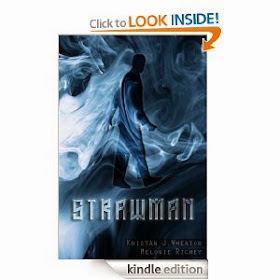 |
"A madman is on the loose! Can you play his mind games and win? Can you catch him before he strikes again?"
That is how my co-author, Mel Richey, and I introduce our new gamebook, Strawman (now on sale at Amazon). It's part adventure novel, part game, and part teaching tool.
Let me break that down for you a bit...
Inspired by our work on the Intelligence Advanced Research Project's Activity's SIRIUS project (you know, the one where they are trying to build video games to teach analysts about cognitive biases?) and our colleagues on the Boeing team, Mel and I decided to try to do something similar.
We didn't have the kind of money necessary to design a video game so we decided to write a "gamebook". What's a gamebook, you ask? Well, some people call it "interactive fiction" but most people remember it as the old "choose your own adventure" style book. This format forces readers to make decisions and enjoy success or suffer the consequences as they move through the story. Strawman, for example, has eight possible endings, depending on how well you do in each scenario.
Recently made popular again by the phenomenal success of Ryan North's To Be Or Not To Be gamebook, this format is also perfect for a guided learning experience.
That's right! Wrapped up in the middle of this adventure story filled with spies and terrorists and mad bombers, are lessons about how cognitive biases affect our judgement and decisionmaking. In fact, understanding these lessons are crucial to the reader's success. Each scenario hinges on the reader's ability to spot the bias and to take corrective action in order to successfully move the story forward.
Don't get me wrong - there is nothing artificial about our scenarios. We built each of them around real world incidents where bias was the cause of intelligence failure or around experiments where bias was successfully elicited.
Strawman only covers three of IARPA's "Big Six" cognitive biases: Projection, Representativeness and Anchoring. The other three biases will have to wait for volume 2...
In addition to teaching readers how to recognize these three biases "in the wild", however, Strawman also teaches a way to mitigate their effects. Through a series of guided exercises, we try to teach the reader to be able to put him or her self into someone else's shoes - to see the situation from the perspective of the other guy. While this approach will not make up for facts that are missing from an analysis, we believe that it will help analysts weigh the evidence they do have more accurately.
We tried to write Strawman at an advanced high school or early college level but we have been pleasantly surprised at how many of our reviewers on both sides of 20 really enjoyed the book. Here are a few of their comments:
“Recognition of cognitive bias in one’s own thinking as well as in others is a key skill for effective analysis. New and imaginative methods for teaching this skill, such as Strawman, are badly needed.” -- Richards J. Heuer, Jr., Former CIA Analyst, author of The Psychology of Intelligence Analysis
"What I like the most about Wheaton and Richey’s Strawman is that, even though it’s billed as a choose-your-own-adventure style gamebook, it actually feels a bit like a videogame, as it introduces readers (players?) to three psychological biases through a set of early missions that lead into the main story, like a good set of tutorial levels for a videogame. Also like a good videogame, Strawman’s story ingeniously provides an in-game piece of hardware to help scaffold player learning, helping readers see situations from different perspectives. This crutch is taken away for later missions, making for a nicely-designed difficulty curve. Meanwhile, readers are drawn into a compelling story arc that builds steam and brings it all together with a satisfying final mission that’s straight out of NCIS or 24." -- Mark Chen, Author of Leet Noobs: The Life And Death Of An Expert Player Group In World Of Warcraft.
“An innovative, engaging read. With its unusual format and accessible writing style it’s perfect for high school or college crowds all the way up to professionals in the field. If you’re interested in cognitive bias, Strawman will teach you how to identify and how to eliminate it.“ --Josh Klein, hacker, author of Reputation Economics: Why Who You Know Is Worth More Than What You Have and host of NatGeo's The Link
"Strawman is a must read for all entry level intelligence analysts, in any area - military, government or industry. Mel Richey and Kris Wheaton have produced a very interesting and eminently sensible approach to learning about the perils of cognitive biases and the adverse effects they can have on decision-making. Moreover, those who teach intelligence will find that Strawman helps them bring new and profitable excitement to any class." -- James S. Cox Ph.D. Brigadier-General (Ret'd), Vice President, Academic Programs, Canadian Military Intelligence AssociationStrawman is currently available for download at Amazon's Kindle Store. Don't have a Kindle? No worries! Amazon has free Kindle Reader Apps for almost every device, including PCs, smartphones and tablets.
We hope you enjoy Strawman!
No comments:
Post a Comment